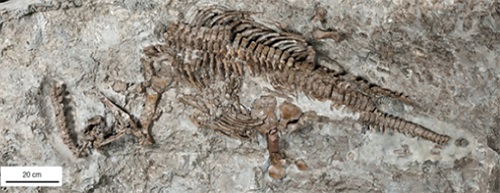News
Plesiosaurias Survived Mass Extinction Updated in March 2018
In theory, first creatures were born on this earth around 4 billion years ago after the earth itself came into existence 4.6 billion years ago. One of the first organisms on earth resembled bacteria. Their lives are being carried down to us in an unbroken line, but several mass extinctions have occurred on the way. Some mass extinctions wiped away 90 percent of life on earth.
There have been five mass extinctions in the past. The most famous one being the fifth one. The fifth one occurred around 65 million years ago when all the dinosaurs perished. Its cause can be traced back to a massive meteorite with a diameter of 10 kilometers. The meteorite struck down on the ocean off of Mexico. Besides that, the third and largest mass extinction occurred 250 million years ago. The fourth one had occurred about 200 million years ago in between the Triassic era and Jurassic era.
In mass extinctions, most species on earth vanished in short periods of time. How could so many living beings disappear at once? That is a very interesting question. On the other hand, what kind of specific traits allowed organisms to survive such harsh environments? That is an equally interesting question.
From a stratum of late Triassic era found in Germany, Dr. Tanja Wintrich’s (Bereich Palaontologie; Seinmann-Institut fur Geologie Mineralogie und Palantologie, University of Bonn, Germany) team had discovered fossils of sea reptiles called Plesiosauria, and announced of this discovery in a recent paper. It is a rather young Plesiosauria with a length of 2.4 meters. Some say that Plesiosauria had existed since the Triassic era. But there has not been enough fossils or other evidences that can restore the whole body of Plesiosauria to verify that clearly. Some even said that they came into existence in the Jurassic era. In this research however, it was determined that during the Triassic era, Plesiosauria had already evolved to a state identical to that of Jurassic era, and that they were able to survive the fourth mass extinction.
Plesiosauria is a large sea reptile which thrived during the Jurassic era and in the following Cretaceous period. It overlaps with the time when dinosaurs flourished. However, their bodies were chubby, with long necks and four finned legs, unlike the upright walking dinosaur which had straight legs that pointed downward to the ground.
According to Dr. Yasuhisa Nakajima (Atmosphere and Ocean Research Institute, University of Tokyo), there were various body parts remaining in the fossils found in the Triassic stratum and their characteristics had matched the traits of Plesiosauria. Moreover, there were traces of developed blood vessels found in the remaining bone tissues of the fossil. This is a structure unique to animals that generate heat inside the body, like fast-growing mammals and birds. Jurassic Plesiosauria also displays this feature. Therefore, Plesiosauria had overcome mass extinction by preserving this feature.
The four legs of Plesiosauria had become fin-like flippers and its long neck did not seem to flex very easily. According to Dr. Nakajima, this is a suitable body trait for animals living in the open sea rather than the coast. The closely related "Placondontia" family, which resemble the tortoise, was extinct at the end of the Triassic era. They, on the other hand, seemed to have been living along the coast.
Based on the results of this study, it is estimated that Plesiosauria which survived mass extinction at the end of the Triassic period lived in the open ocean and their growth rate was fast. If an organism lived in the open ocean, it is probably less susceptible to the fluctuation of sea level caused by sudden changes in the global environment. Even if sea level should suddenly sink low, they would not be deprived of their habitat: shallow waters. Also, if they grow fast, they may be able to reproduce early on in life. On the other hand, if growth is fast, much food would have been needed. It is still unknown whether such a trait was an advantage for survival. With accumulation of such facts, the mystery of mass extinction will be unraveled step by step.
www.nature.com/articles/nature24630https://www.hakubi.kyoto-u.ac.jp/eng

Photos courtesy of Japan Science and Technology Agency







